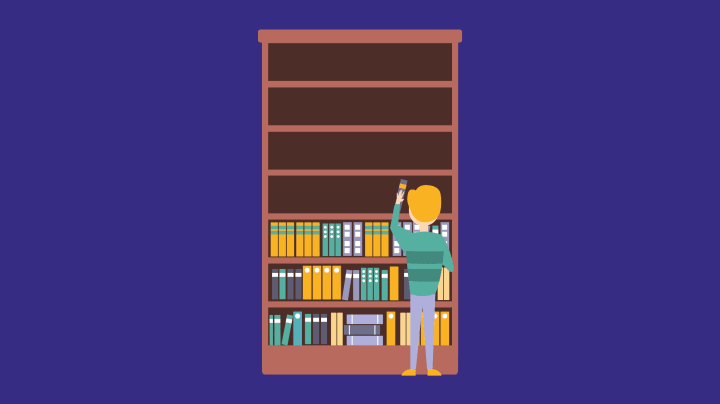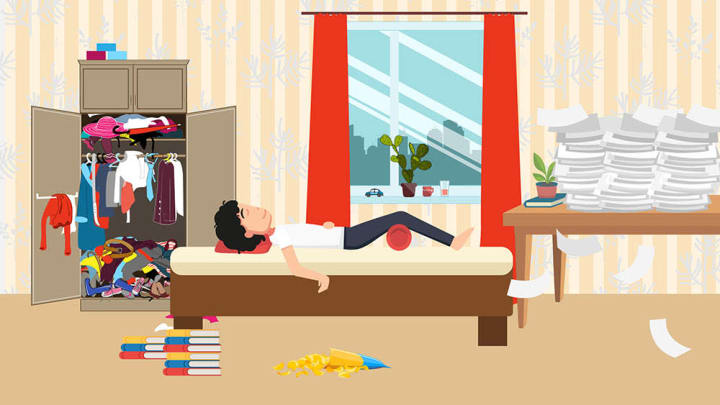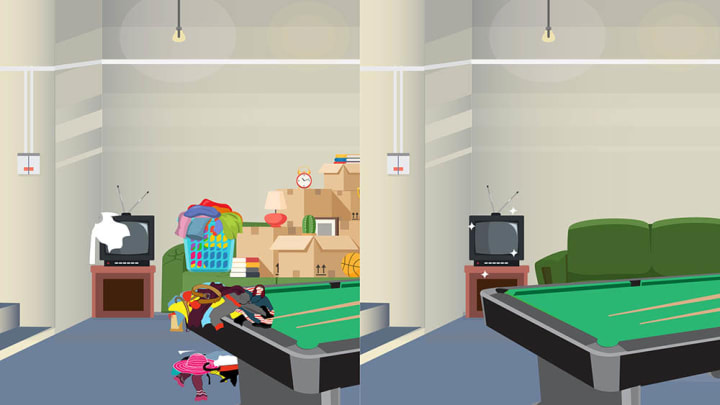How Minimizing Clutter Can Create Joy: The KonMari Method™

Since the rise of American consumer culture in the 1920s, our society has steadily maintained the idea that success, happiness, and a good life is gleaned from a house full of material things – but with the recent popularity of television shows like “Tidying Up with Marie Kondo” and tidying techniques like the KonMari Method™, we are collectively beginning to realize that the things we’ve grown so accustomed to owning can end up owning us.
With the bombardment of our omnipresent, consumer-centric culture and the constant mental “noise” we experience from our interconnected lives, simple living (aka minimalism) has promised to be the remedy we’ve secretly needed for some time now – guaranteeing relief from common stressors associated with an abundance of belongings and the psychological baggage your stuff can create.
Contrary to common belief, utilizing minimalist techniques to take control of home clutter doesn’t mean you have to throw out all of your belongings, sell your car, or quit your job. With newly trademarked, minimalist organizational approaches – like Marie Kondo’s KonMari Method™ – you can “spark joy” within your home again by gently getting rid of things that no longer provide you with purpose while tactfully storing your meaningful belongings.
But to fully understand how Marie Kondo’s KonMari Method™ can help you control your clutter during spring cleaning, it’s important to first learn exactly what clutter is, why humans collect it, and the ways a messy home can affect your well-being.
What Constitutes as Clutter?
When you first think of clutter, you might recall nightmarish visions from the television series “Hoarders.” From living rooms filled with mountains of junk to kitchens covered with boxes of belongings, compulsive hoarding disorder is the most extreme version of an overly-stuffed space. But your home doesn’t need to be filled from floor to ceiling in order for clutter to have a negative impact on your mental state.
Having clutter means having physical objects – such as clothing, books, documents, or inherited family belongings – that interfere with your personal space, providing you with little to no inherent value.
Over time, these types of items can build up and start to play a subconscious role in your psychological health, causing your home to feel less like a sanctuary and more like a place that induces mental turmoil without you even realizing it.
Why Humans Collect Clutter

When transforming a house into a home, humans take in a variety of possessions that play a central role in defining a sense of self. Items can express unique aspects of personality, represent past memories or experiences, and even represent accomplishments and connections to important people in our lives – which makes it easy to become psychologically attached to our belongings. (Roster, Ferrari, & Jurkat, 2016)
Four key reasons humans hold onto possessions include (Steketee, Frost, and Kyrios, 2003):
- Hyper-attachment to goods as a source of identity
- Reliance upon possessions to embody and enable memory of past events
- A strong need and desire to maintain control over possessions
- Heightened sense of responsibility for possessions
While personal possessions can play a positive role in defining who we are, they can also take on a maladaptive form when they grow in excess, threatening daily life functions – both physical and mental – within the home environment.
How Clutter Can Cramp Your Comfort

When your personal belongings begin to take control of your space, they also begin to affect your health in dramatic ways, including:
- Low Subjective Well-Being – Your home is an escape from the outside world, allowing you to feel comfort and satisfaction with your life while inside it. When it starts to fill up with clutter, it can cause your perception of your subjective well-being (how you experience the quality of your life through emotional reactions and cognitive judgements) to decline rapidly.
- Unhealthy Eating Habits – Cluttered, chaotic spaces – such as messy kitchens – trigger unhealthy eating behaviors. Homes with excessive clutter can make homeowners feel out of control of their own environment, causing vulnerability to irrational choices they would otherwise not make.
- Poor Mental Health – Clutter in the home creates an immense amount of stress and psychological pressure, causing spikes in cortisol levels. If clutter becomes a mainstay, heightened cortisol levels can slowly change the structure of the brain – which can cause acute sensitivity to stress on a regular basis.
- Difficulty Focusing and Processing Information – When clutter piles up in the home, it can play a major role in your brain’s processing power. With so much visual stimuli packed into small spaces, your brain can have a difficult time focusing on any one thing. Clutter clouds your mind’s visual system and distracts your thoughts, hindering your ability to complete simple, everyday tasks.
All of these psychological factors can play a pivotal role in the quality of your interpersonal relationships, the breadth of your happiness, and your willingness to move forward with your life.
Decluttering Your Dwelling this Spring with Marie Kondo’s KonMari Method™

While controlling clutter at home this spring may seem overwhelming at first, setting aside the time to cleanse your space is crucial to your psychological well-being. “The question of what you want to own is actually the question of how you want to live your life,” Marie Kondo says in her best-selling book, The Life-Changing Magic of Tidying Up: The Japanese Art of Decluttering and Organizing.
According to Marie Kondo, successfully decluttering with the KonMari Method™ begins with cleansing your home by category – primarily clothes, books, papers, miscellaneous items, and sentimental items. Rather than slowly picking through disorganized stuff over a long period of time, KonMari advocates that you go through your entire home and pluck each item into a category, placing them into one large pile.
After you make your pile, sort through each item and decide whether or not it still creates joy for you. With the belongings that no longer spark joy, you thank them for their service and gently place them in a box or bag for donations. With the belongings that you still hold near and dear to your heart, you can fold, sort, and/or file them in an organizational way, using containers or drawers.
The Sweeping Effectiveness of KonMari for Your Home
Marie Kondo’s KonMari Method™ of decluttering during spring cleaning is one of the most effective strategies to refreshing the quality of your home life. Confronting all of your belongings methodically in one massive pile will provide you with a persuasive visual of just how cluttered your living space has been – especially with items that are no longer important to you or the progression of your life.
Maintain Your Mementos With a Storage Unit
At Devon Self Storage, we know just how difficult it can be to get rid of belongings that still have meaning while employing Marie Kondo’s KonMari Method™. From inherited items passed down generationally to mementos of life’s best memories, there are certain things you just can’t let go of while minimizing your clutter.
If you’re on the fence about parting ways with your possessions during spring cleaning, you can utilize a self storage unit to stow away all your sentimental stuff – allowing your home to become a spotless sanctuary that’s free from items you don’t use on a daily basis. To find out how a storage unit can free your space (and your mind) from clutter, don’t hesitate to get in touch with your local Devon Self Storage facility today!